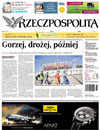“Poorer, dearer, later,” headlines Rzeczpospolita describing problems and delays to construction of a national stadium in Warsaw and a major motorway ahead of the Euro 2012 football tournament in Poland. In both cases companies offered bargain basement prices to win the contract and now find themselves unable to meet deadlines or quality standards. With the tournament approaching, they are hoping to renegotiate price terms, the Warsaw daily notes. In what was expected to be a bridgehead for further road investments in Europe, the Chinese Covec consortium asked for 1.3bn PLN (€330m) to build a 50-km stretch of the A2 motorway between Warsaw and Łódź, or 420m PLN (€106m) below other bids. Struggling to pay the Polish subcontractors, Covec was forced to stop construction works and now may lose the contract and have to pay the Polish investor 740 m PLN (€186m) in damages. “These problems are the consequence of awarding contracts based on the lowest price”, says transportation expert Adrian Furgalski. “In most EU countries ‘the most cost-effective’ bids are preferred, which does not mean the least expensive”, Rzeczpospolita concludes.
Do you like our work?
Help multilingual European journalism to thrive, without ads or paywalls. Your one-off or regular support will keep our newsroom independent. Thank you!
















